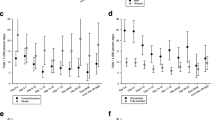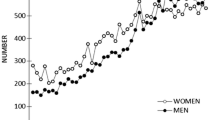Abstract
Summary
In Victoria, Australia, the age-standardised incidence of fall-related hip fracture hospitalisations decreased significantly by 25% over the period 1998/1999–2008/2009. Significant decreases in fall-related hip fractures were observed in males and females, across all 5-year age groups, in Australian-born and overseas-born Victorians, in all socio-economic quintiles and in community-dwelling older people.
Introduction
The study aim was to investigate trends in the incidence of fall-related and hip fracture hospitalisations among Victorians aged 65 years and older overall and by age, gender, country of birth, socio-economic status (SES) and location of the event (home, residential care institution, etc.) over the 11-year period 1998/1999 to 2008/2009.
Methods
Annual counts and age-standardised rates for fall-related hospitalisations among people aged 65 years and older were estimated using Victorian hospital admissions data. The statistical significance of changes in trends over time were analysed using a log-linear regression model of the rate data assuming a Poisson distribution of cases.
Results
Although the age-standardised incidence of fall-related hospitalisations increased significantly by 13% (95% confidence interval [CI], 9% to 18%) in Victoria, the age-standardised incidence of fall-related hip fracture hospitalisations decreased from 600/100,000 in 1998/1999 to 467/100,000 in 2008/2009 — an estimated overall reduction of 25% (95% CI, −29% to −22%). By contrast, the age-standardised incidence of fall-related hospitalisations for fractures at other body sites either increased significantly or showed no significant change. Significant decreases in fall-related hip fractures were observed in both males and females, across all 5-year age groups, in both Australian-born and overseas-born Victorians, in all socio-economic quintiles and in community-dwelling older people but not in people living in residential care facilities.
Conclusion
Despite the downward trend in the age-standardised incidence of fall-related hip fractures in Victoria, the burden of fall-related and hip fracture hospitalisations on health care systems and the community is set to escalate due to the ageing of the Victorian population.
Similar content being viewed by others
References
Cummings SR, Melton LJ 3rd (2002) Epidemiology and outcomes of osteoporotic fractures. Lancet 359:1761–1767
Sanders KM, Nicholson GC, Ugoni AM, Pasco JA, Seeman E, Kotowicz MA (1999) Health burden of hip and other fractures in Australia beyond 2000. Projections based on the Geelong Osteoporosis Study. Med J Aust 170(10):467–470
Australian Institute of Health and Welfare (2010) The problem of osteoporotic hip fracture in Australia. AIHW bulletin no. 76. Cat. no. AUS 121. AIHW, Canberra
Cassell E, Clapperton A (2010) Fall injury prevention in Victoria, Australia—progress against predictions. Presented at the 4th Australian and New Zealand Falls Prevention Society Conference. 21–23 November 2010, Dunedin, New Zealand
Pasco JA, Brennan SL, Henry MJ, Nicholson GC, Sanders KM, Zhang Y, Kotowicz MA (2011) Changes in hip fracture rates in southeastern Australia spanning the period 1994–2007. J Biomed Mater Res 26(7):1648–1654
Watson WL, Mitchell R (2010) Conflicting trends in fall-related injury hospitalisations among older people: variations by injury type. Osteoporos Int 22(10):2623–2631
Cassell E, Clapperton A (2008) Preventing injury in Victorian seniors aged 65 years and older. Hazard 67:1–21, Victorian Injury Surveillance Unit
Fisher AA, O’Brien ED, David MW (2009) Trends in hip fracture epidemiology in Australia: possible impact of bisphosphonates and hormone replacement therapy. Bone 45(2):246–253
Brauer CA, Coca-Perraillon M, Cutler DM, Rosen AB (2009) Incidence and mortality of hip fractures in the United States. JAMA 302(14):1573–1579
Leslie WD, O’Donnell S, Jean S, Lagacé C, Walsh P, Bancej C, Morin S, Hanley DA, Papaioannou A (2009) Trends in hip fracture rates in Canada. JAMA 302(8):883–889
Kannus P, Niemi S, Parkkari J, Palvanen M, Vuori I, Jävinen M (2006) Nationwide decline in incidence of hip fractures. J Bone Miner Res 21(12):1836–1838
Dimai HP, Svedbom A, Fahrleitner-Pammer A, Pieber T, Resch H, Zwettler E, Chandran M, Borgström F (2010) Epidemiology of hip fractures in Austria: evidence for a change in the secular trend. Osteoporos Int 22(2):685–692
Langley J, Samaranayaka A, Davie G, Campbell AJ (2010) Age, cohort and period effects on hip fracture incidence: analysis and predictions from New Zealand data 1974–2007. Osteoporos Int 22(1):105–111, Epub 2010 Mar 23
Wu TY, Jen MH, Bottle A, Liaw CK, Aylin P, Majeed A (2010) Admission rates and in-hospital mortality for hip fractures in England 1998 to 2009: time trends study. J Publ Health 33(2):284–291
Hernández JL, Olmos JM, Alonso MA, González-Fernández CR, Martínez J, Pajarón M, Llorca J, González-Macías J (2006) Trend in hip fracture epidemiology over a 14-year period in a Spanish population. Osteoporos Int 17:464–470
Icks A, Haastert B, Wildner M, Becker C, Meyer G (2008) Trend of hip fracture incidence in Germany 1995–2004: a population-based study. Osteoporos Int 19:1139–1145
Piscitelli P, Gimigliano F, Gatto S, Marinelli A, Gimigliano A, Marinelli P, Chitano G, Greco M, Di Paola L, Sbenaglia E, Benvenuto M, Muratore M, Quarta E, Calcagnile F, Colí G, Borgia O, Forcina B, Fitto F, Giordano A, Distante A, Rossini M, Angeli A, Migliore A, Guglielmi G, Guida G, Brandi ML, Gimigliano R, Iolascon G (2010) Hip fractures in Italy: 2000–2005 extension study. Osteoporos Int 21:1323–1330
National Centre for Classification in Health (2006) International statistical classification of diseases and related health problems, 10th revision, Australian modification (ICD-10-AM), 5th edn. National Centre for Classification in Health, Sydney
Gibson D, Braun P, Benham C, Mason F (2001) Projections of older immigrants: people from culturally and linguistically diverse backgrounds, 1996–2026, Australia. AIHW cat. no. AGE 18. Australia Institute of Health and Welfare (Aged Care Series no. 6), Canberra
Australian Bureau of Statistics (2008) Socio-Economic Indexes for Areas (SEIFA) — Technical Paper, 2006. ABS Catalogue no. 2039.0.55.001. Canberra
SAS Institute (2003) SAS: statistical software, version 9.1. SAS Institute, Cary
Jamieson LM, Roberts-Thomson KF (2007) Hospitalized head injuries among older people in Australia, 1998/1999–2004/05. Inj Prev 13:243–247
Rizzoli R, Akesson M, Bouxsein M, Kanis JA, Napoli N, Papapoulos S, Reginster JY, Cooper C (2011) Subtrochanteric fractures after long-term treatment with bisphosphonates: a European Society on Clinical and Economic Aspects of Osteoporosis and Osteoarthritis, and International Osteoporosis Foundation Working Group Report. Osteoporos Int 22:373–390
Abrahamsen B, Eiken P, Eastell R (2010) Cumulative alendronate dose and the long-term absolute risk of subtrochanteric and diaphyseal femur fractures: a register-based national cohort analysis. J Clin Endocrinol Metab 95(12):5258–5265
Nymark T, Lauritsen JM, Ovesen O, Röck ND, Jeune B (2006) Decreasing incidence of hip fracture in the Funen County, Denmark. Acta Orthop 77(1):109–113
Maravic M, Taupin P, Landais P, Roux C (2010) Change in hip fracture incidence over the last 6 years in France. Osteoporos Int 22(3):797–801
Holt G, Smith R, Duncan K, Hutchison JD, Reid D (2009) Changes in population demographics and the future incidence of hip fracture. Injury 40(7):722–726
Löfman O, Berglund K, Larrson L, Toss G (2002) Changes in hip fracture epidemiology: redistribution between ages, genders and fracture types. Osteoporos Int 13:18–25
Guilley E, Chevalley T, Herrmann F, Baccino D, Hoffmeyer P, Rapin CH, Rizzoli R (2008) Reversal of the hip fracture secular trend is related to a decrease in the incidence in institution-dwelling elderly women. Osteoporos Int 19(12):1741–1747
Bradley C (2011) Trends in fall-related hospitalisations for older Australians: what’s going on? Presented at the 10th National Conference on Injury Prevention and Safety Promotion. Brisbane 2011. Available at: http://www.icebergevents.com/injuryprevention2011/Welcome/ (accessed 16 January 2012)
Clapperton A, Cassell E (2009) The impact of area socioeconomic inequity on serious injury in Victoria. Hazard 70:1–29, Victorian Injury Surveillance Unit
Gillespie L, Handoll H (2009) Prevention of falls and fall-related injuries in older people. Inj Prev 15:354–355
Jarvinen TLN, Sievanen H, Khan KM, Heinonen A, Kannus P (2008) Shifting the focus in fracture prevention from osteoporosis to falls. BMJ 336:124–126
Emkey RD, Ettinger M (2006) Improving compliance and persistence with bisphosphonate therapy for osteoporosis. Am J Med 119(4A):18S–24S
Kothawala P, Badamgarav E, Ryu S, Miller RM, Halbert RJ (2007) Systematic review and meta-analysis of real-world adherence to drug therapy for osteoporosis. Mayo Clin Proc 82:1493–1501
Australian Institute of Health and Welfare (2007) Older Australia at a glance, 4th edn. Cat. No. AGE52. AIHW, Canberra
Australian Institute of Health and Welfare (2011) National Drug Strategy Household Survey report. Drug statistics series no. 25. Cat. No. PHE 145. AIHW, Canberra
Vu T, Finch CF, Day L (2011) Patterns of comorbidity in community-dwelling older people hospitalised for fall-related injury: a cluster analysis. BMC Geriatr 11:45
Australian Institute of Health and Welfare (2011) Projections of the incidence of treated end-stage kidney disease in Australia Cat. no. PHE 150. AIHW, Canberra
Australian Institute of Health and Welfare (2010) Australia’s health 2010. Australia’s health no. 12. Cat. no. AUS 122. AIHW, Canberra
Australian Institute of Health and Welfare, Bennett SA, Magnus P, Gibson D (2004) Obesity trends in older Australians. Bulletin no. 12. AIHW cat. No. 42. AIHW, Canberra
Moayyeri A, Luben RN, Wareham NJ, Khaw KT (2011) Body fat mass is a predictor of risk of osteoporotic fractures in women but not men: a prospective population study. J Intern Med. doi:10.1111/j.1365-2796.2011.02443.x [Epub ahead of print]
Migliaccio S, Greco EA, Fornari R et al (2011) Is obesity in women protective against osteoporosis? Diabetes, metabolic syndrome and obesity: targets and therapy. Diabetes Metab Syndr Obes 4:273–282
Douchi T, Yamamoto S, Kuwahata R, Oki T, Yamasaki H, Nagata Y (2000) Effect of non-weight bearing body fat on one mineral density before and after menopause. Obstet Gynecol 96(1):13–17
Judd HL, Shamonki IM, Frumar AM, Lagasse LD (1982) Origin of serum estradiol in postmenopausal women. Obstet Gynecol 59(6):680–686
Lang T, Koyama A, Li C et al (2008) Pelvic body composition measurements by quantitative computed tomography: association with recent hip fracture. Bone 42:798–805
Acknowledgements
E. Cassell and A. Clapperton were supported by the Victorian Injury Surveillance Unit’s core grant from the Victorian Department of Health.
Conflicts of interest
None.
Author information
Authors and Affiliations
Corresponding author
Rights and permissions
About this article
Cite this article
Cassell, E., Clapperton, A. A decreasing trend in fall-related hip fracture incidence in Victoria, Australia. Osteoporos Int 24, 99–109 (2013). https://doi.org/10.1007/s00198-012-1937-6
Received:
Accepted:
Published:
Issue Date:
DOI: https://doi.org/10.1007/s00198-012-1937-6




